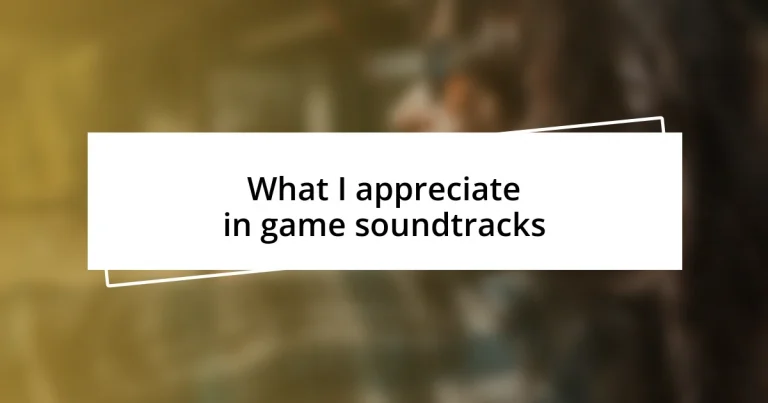Key takeaways:
- Game soundtracks play a crucial role in enhancing emotional depth and immersion, transforming gameplay into memorable experiences.
- Key elements of effective game music include thematic coherence, instrumentation, and dynamics, which work together to influence player engagement and emotional connection.
- Diverse genres in game soundtracks contribute uniquely to the gaming experience, creating powerful atmospheres that resonate with players and enhance storytelling.
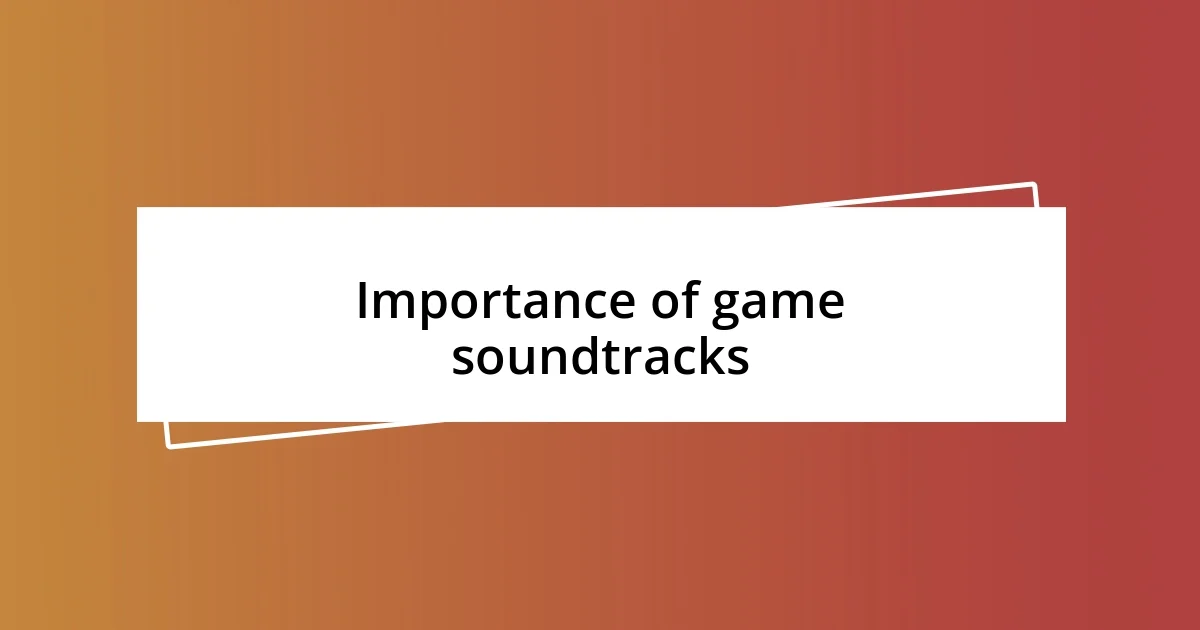
Importance of game soundtracks
Game soundtracks are more than just background music; they are a vital part of the gaming experience. I remember the first time I stepped into the haunting world of “The Last of Us.” The music set such a profound emotional tone that it felt like a character in its own right, amplifying the weight of every decision I made. Doesn’t it make you think about how a well-composed score can change your perception of an entire narrative?
The emotional depth that a soundtrack provides can turn a good game into a memorable one. For instance, when I played “Journey,” the music ebbed and flowed, pulling me deeper into its mesmerizing world. Each note seemed to resonate with my character’s journey, creating a bond that lingered long after I pressed “start.” Can you recall a moment in a game where the music shaped your emotions? It’s incredible how sound can evoke feelings that visuals alone might not capture.
Moreover, soundtracks create an immersive atmosphere that enhances gameplay. In “Halo,” the score is legendary, its epic orchestration stirring excitement and adrenaline as I navigated through alien landscapes. This auditory experience is crucial; it connects players to the game’s universe, making every victory feel even sweeter. Isn’t it fascinating how sound can elevate an ordinary moment into something extraordinary?
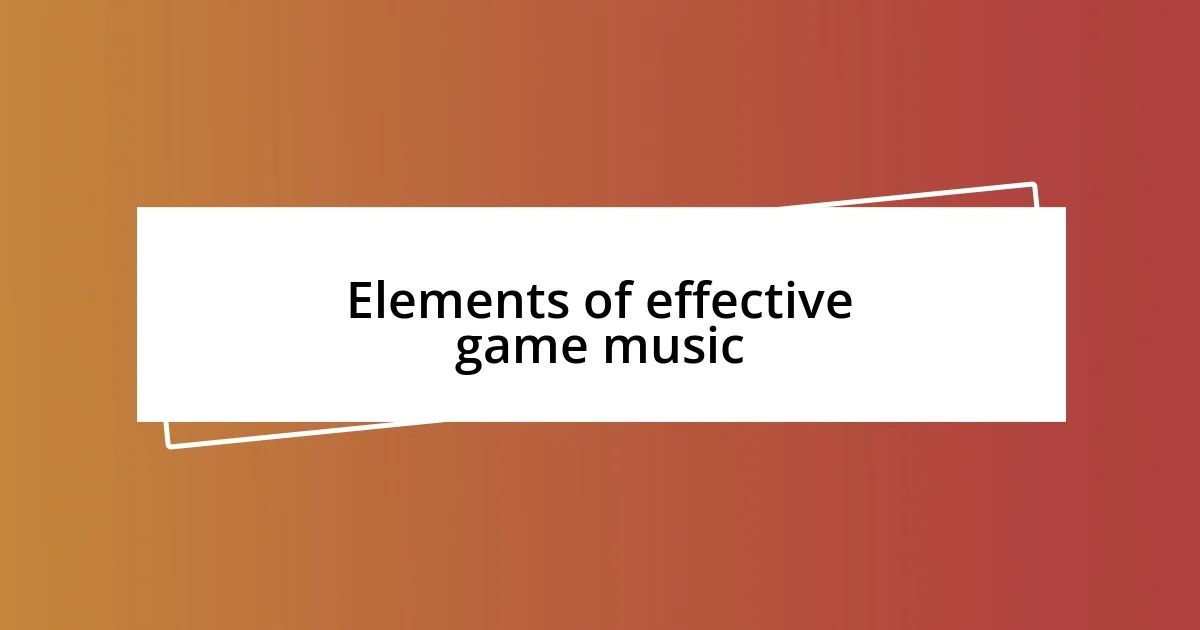
Elements of effective game music
Effective game music hinges on several elements that work together to create a lasting impact. For me, the most crucial aspect is thematic coherence. When I hear a musical cue that weaves through the narratives of “Final Fantasy,” it immerses me instantly. That recurring motif makes each encounter feel familiar yet fresh, connecting my experiences in a way that enhances my emotional journey through the game.
Instrumentation also plays a pivotal role in effective soundtracks. For example, when I dive into the haunting melodies in “Ori and the Blind Forest,” the delicate piano notes combined with orchestral arrangements make me feel like I’m part of something larger than myself. This careful selection of instruments can evoke a range of emotions, drawing players in with an intensity that dialogues with the game’s visuals.
Lastly, the dynamics of the music—the shifts in volume and tempo—directly influence gameplay. I remember when I played “Celeste”; the music would swell at crucial moments, intensifying my focus as I faced challenging levels. These dynamic shifts not only match the on-screen action but also prompt players to feel the urgency or tranquility of the game’s pace, harmonizing their emotional states with the gameplay itself.
| Element | Description |
|---|---|
| Thematic Coherence | Utilizing recurring motifs to create emotional connections and familiarity. |
| Instrumentation | Choice of instruments to evoke emotions and enhance storytelling. |
| Dynamics | Adjusting volume and tempo to influence pacing and player engagement. |
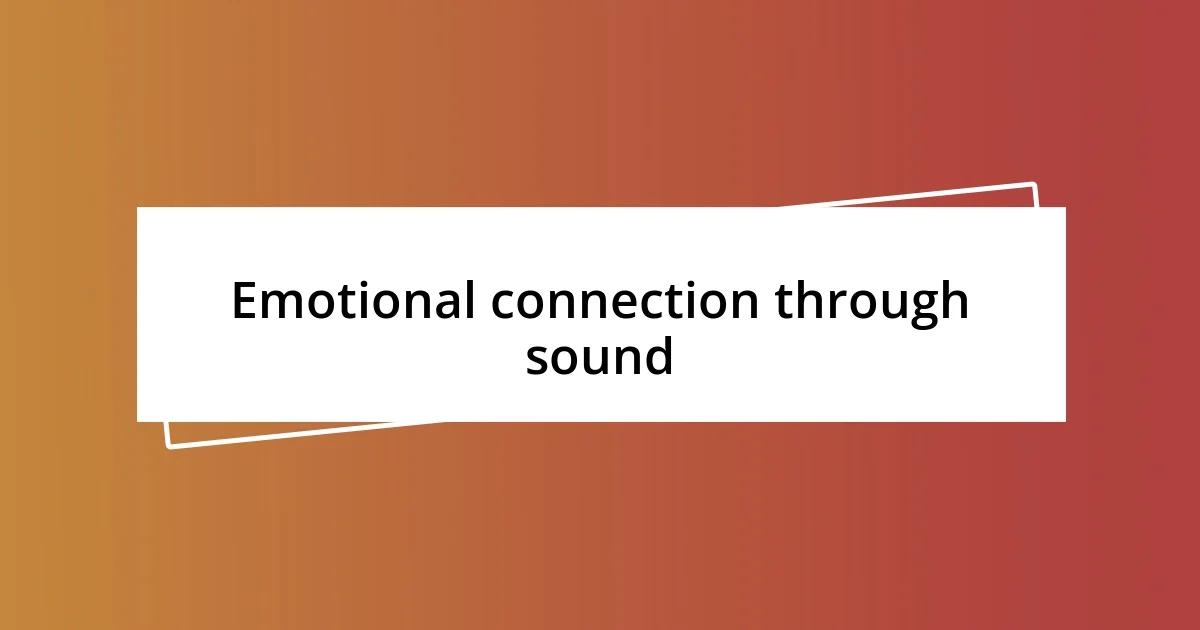
Emotional connection through sound
It’s amazing how sound can forge such deep emotional connections in gaming. I still remember the first time I heard the soaring score of “Elder Scrolls V: Skyrim.” As I traversed the breathtaking landscapes, the music swelled with every dragon encounter, making each battle feel epic and transformative. I found myself emotionally invested, feeling the weight of my character’s journey amplified by the stirring notes that echoed my triumphs and defeats.
- Music often reflects the player’s emotional state.
- Subtle melodies can evoke memory, nostalgia, and longing.
- The crescendo of a soundtrack can parallel critical narrative shifts.
- Instrumental themes can encapsulate the essence of the game’s world.
Reflecting on these moments, I realize that the emotional essence of a game is often encapsulated in its soundtrack. When I navigate through the harrowing story of “Life is Strange,” the music plays like a thread weaving my emotions together. It can be the soft strumming of a guitar during a pivotal choice or the haunting echoes of memories lost. Those soundscapes shape my experience, coloring the gameplay with a spectrum of feelings that stay with me long after the credits roll.
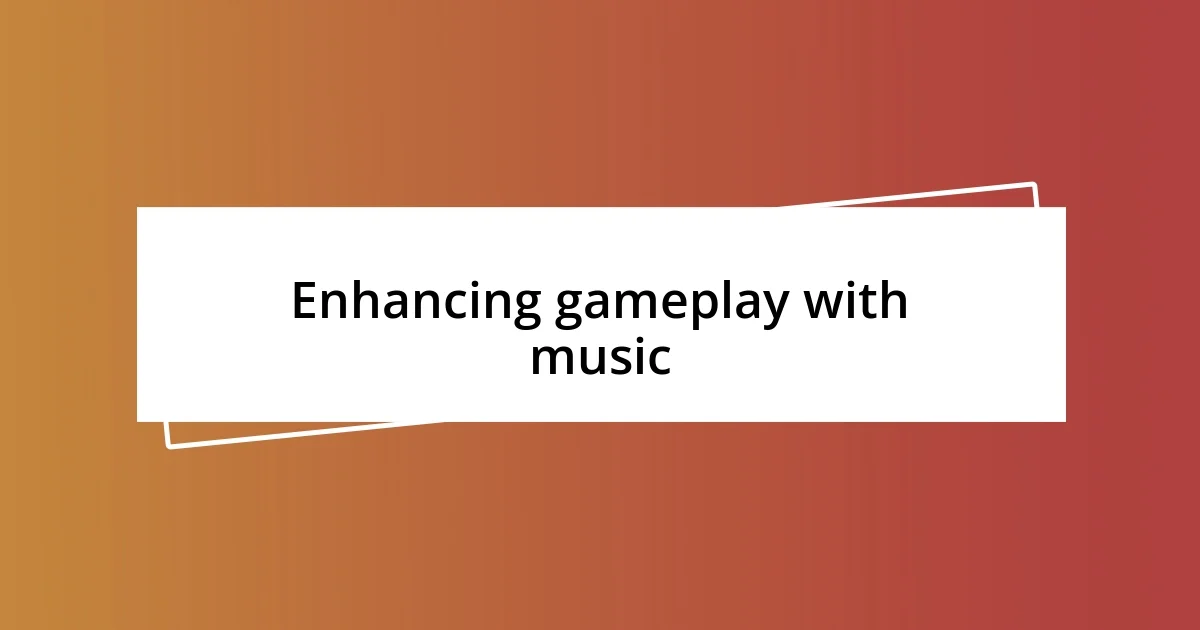
Enhancing gameplay with music
When it comes to enhancing gameplay, I often find that the right music can elevate a simple action to something extraordinary. Take the “Shadow of the Colossus,” for instance. As I climbed those massive giants, the orchestral swells made my heart race; it felt as if the music was guiding my emotions, synchronizing perfectly with the behemoth’s movements. Have you ever felt that rush when the notes hit just right?
In my experience, music can also transform mundane moments into memorable ones. I think back to my time playing “Stardew Valley.” The gentle melodies playing as I tended to my crops brought an unexpected sense of peace, inviting me into the game’s world. It’s incredible how something as simple as background music can encourage you to pause, breathe, and fully immerse yourself in an otherwise routine activity. It makes me wonder, how much more could we appreciate our surroundings with the right soundtrack?
The interplay of sound and gameplay creates anticipation that is hard to replicate. When I finally faced off against the final boss in “Dark Souls,” the climactic music ignited a surge of adrenaline, pushing me to summon every ounce of skill I’d honed throughout the game. Did the music amplify my determination? Absolutely! That moment demonstrated how game design and sound can converge to create an unforgettable experience, one that resonates well beyond the screen.
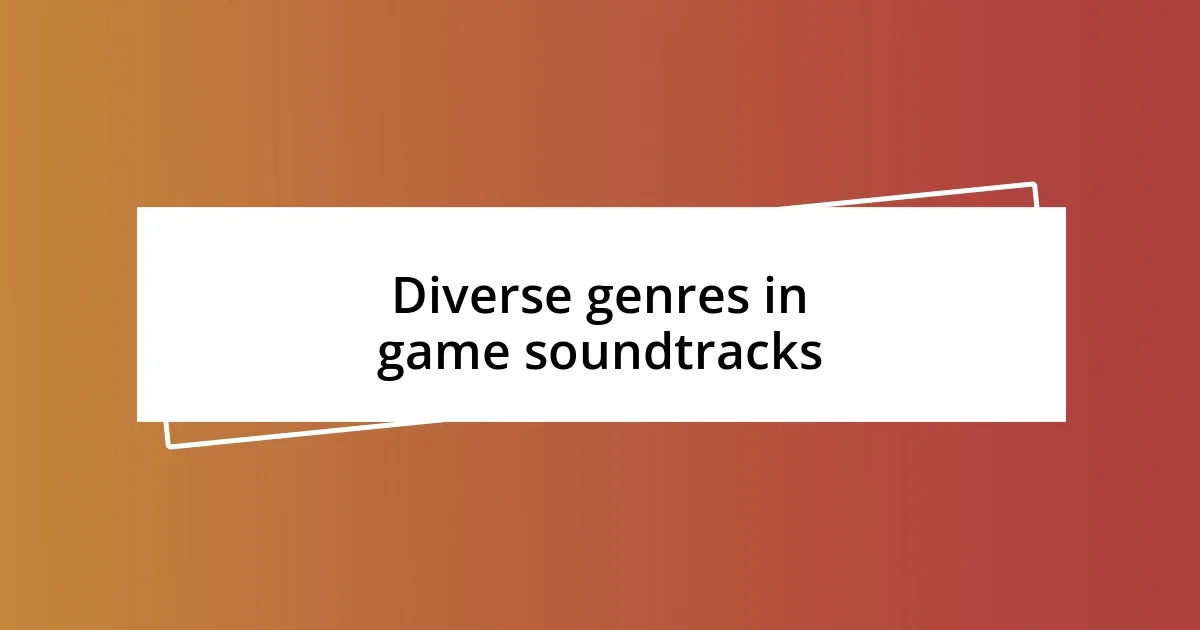
Diverse genres in game soundtracks
The world of game soundtracks is a beautiful tapestry of diverse genres, each enhancing the gaming experience in unique ways. For instance, I vividly recall playing “Celeste,” where the chiptune-inspired melodies perfectly complemented its pixel art style. The upbeat rhythms made each level exhilarating, giving me the energy to tackle the game’s challenging platforming sections. How often do you find a soundtrack so perfectly matched to a game’s aesthetic?
Jazz-infused soundtracks have also captured my attention, particularly in games like “L. A. Noire.” The smooth saxophone melodies created an immersive film noir atmosphere, whisking me away to a bygone era filled with mystery and intrigue. As I navigated the gritty streets of 1940s Los Angeles, I felt the music enhanced the narrative, making the detective work all the more gripping. It begs the question: can you imagine this game without its jazzy tunes?
I’ve often found orchestral scores to be incredibly moving, especially in games like “The Legend of Zelda: Breath of the Wild.” The sweeping compositions evoke a sense of adventure and wonder as I explore a vast, open world. I remember standing atop a cliff, the music swelling as the sun set over Hyrule, creating a moment of sheer awe. It got me thinking: isn’t it fascinating how different genres can transform gameplay into a more profound experience, connecting us to the game’s universe in such intimate ways?

Memorable themes and scores
Memorable themes have a way of sticking with me long after the game is over. I can’t help but recall the haunting melody of “Final Fantasy VII.” That main theme isn’t just music; it stirs up a whirlwind of nostalgia and emotion. How can a simple tune create such a powerful connection to characters and moments that felt so integral to my journey?
Equally striking is the score from “Bioshock.” The blend of big band music infused with the haunting atmosphere of Rapture always gives me chills. I remember venturing into that eerie, submerged world, where the music echoed around me, amplifying the sense of isolation. Every note seemed to whisper secrets, making me think: doesn’t music have the incredible ability to shape our experiences, reinforcing the themes of a game’s narrative while inviting us deeper into its storyline?
There’s something undeniably powerful about a well-crafted anthem, too. When I hear the score from “Halo,” it evokes an immediate surge of energy and excitement. I still recall the adrenaline pumping through my veins as I battled through Covenant forces. Isn’t it incredible how a single theme can unite the community and create such a strong sense of identity for gamers around the world? Each time I hear it, it feels like a call to arms, binding us through shared experiences.
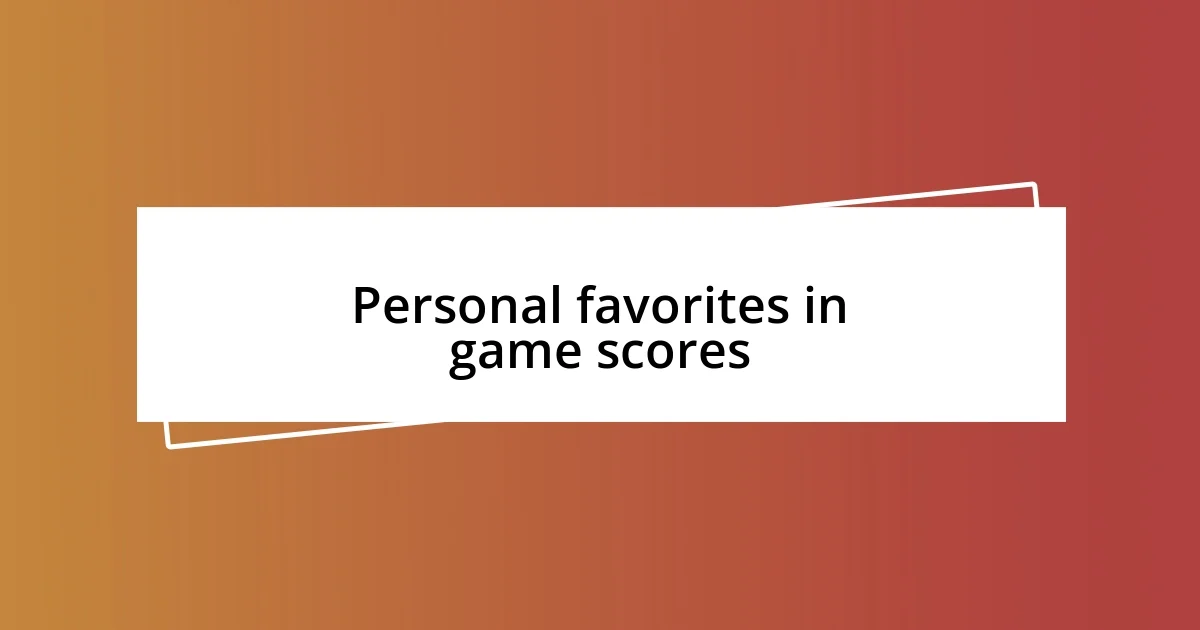
Personal favorites in game scores
One of my all-time favorites has to be the soundtrack from “Journey.” The ethereal scores by Austin Wintory not only accompany the gameplay but also serve as a narrative force. I remember immersing myself in that vast desert, where every note seemed to guide my character’s emotional journey. It made me wonder: how does music have the power to convey feelings that words sometimes can’t?
Similarly, I’ve always been drawn to the music of “Ori and the Blind Forest.” The lush orchestral arrangements match the game’s stunning visuals perfectly, creating an emotional weight that’s hard to shake off. I recall a moment when I stumbled upon a heart-wrenching story element, and the music escalated, reflecting my feelings of hope amid despair. Isn’t it enchanting how the right music can draw us into a world and make us feel profoundly connected to its characters?
Then there’s “Undertale,” where the novelty of its 8-bit music brings a quirky charm that’s both nostalgic and refreshing. I distinctly remember the boss battle music, which infused every confrontation with an exhilarating sense of urgency. Can you feel that driving beat pushing you to be better, to triumph against the odds? It’s moments like these that remind me how seamlessly soundtracks can enhance gameplay, elevating ordinary moments into unforgettable experiences.












